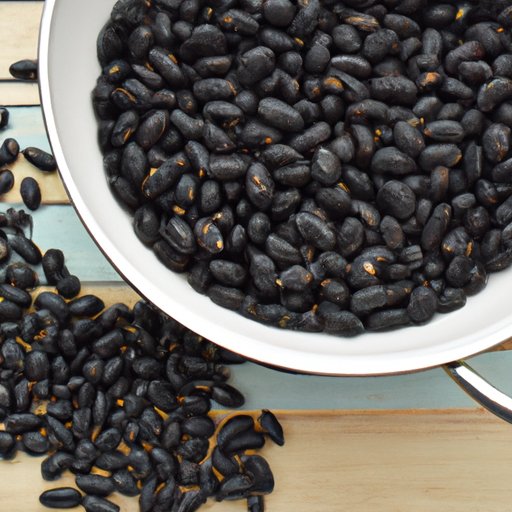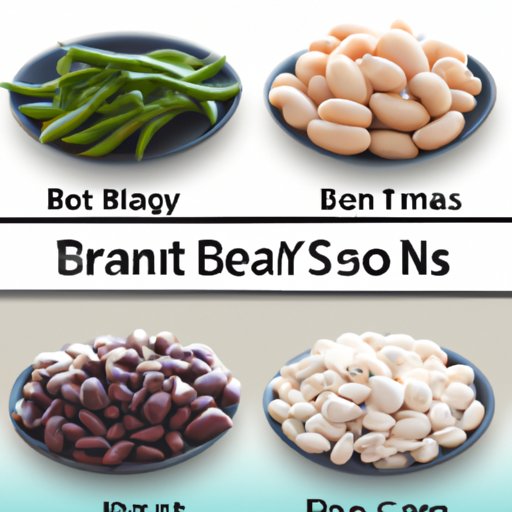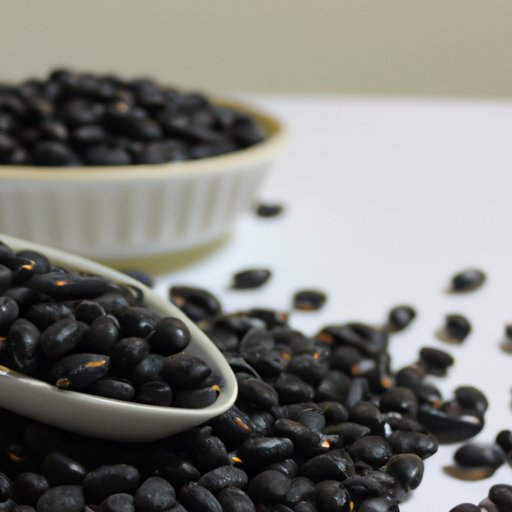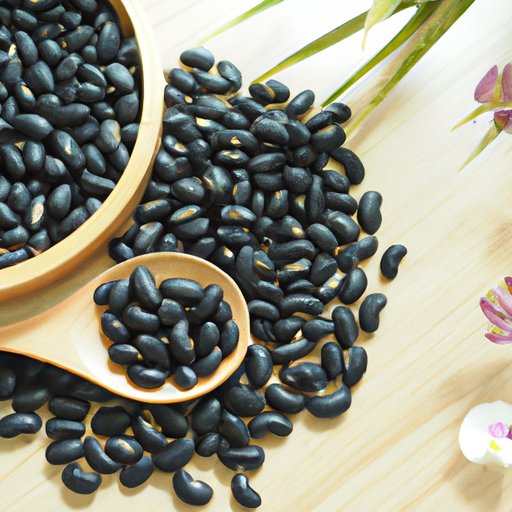Introduction
Black beans are a type of legume that have been popular in many cultures for centuries. They have a mild, nutty flavor and are often used in dishes such as soups, salads, and rice dishes. In addition to being tasty, black beans are also highly nutritious and can provide numerous health benefits when incorporated into your diet.

Exploring the Nutritional Benefits of Black Beans
Black beans are an excellent source of protein, providing about 7.6 grams per 100-gram serving. This makes them a great choice for vegetarians and vegans who need a plant-based source of protein. Black beans are also a good source of dietary fiber, providing about 8.2 grams per 100-gram serving. Dietary fiber is important for digestion and can help reduce cholesterol levels, improve blood sugar control, and promote satiety.
In addition to protein and fiber, black beans are also rich in vitamins and minerals. They contain high amounts of iron, magnesium, potassium, zinc, and folate, as well as smaller amounts of other essential vitamins and minerals. As such, black beans can be a great way to get your daily recommended intake of these important nutrients.
How Adding Black Beans to Your Diet Can Improve Your Health
Incorporating black beans into your diet can provide numerous health benefits. For starters, they are a great source of plant-based protein, which can help keep you feeling full and energized throughout the day. Additionally, the high fiber content of black beans can help improve your digestive health. The dietary fiber found in black beans helps to bulk up stools, which can help reduce constipation and other digestive issues.
The high nutrient content of black beans can also help improve heart health. The protein and fiber found in black beans can help lower cholesterol levels, while the minerals like iron, magnesium, and potassium can help regulate blood pressure. Furthermore, the antioxidants contained in black beans can help reduce inflammation and protect against oxidative damage, which can help prevent cardiovascular disease.
Finally, adding black beans to your diet can help with weight management. The protein and fiber found in black beans can help keep you feeling full for longer, which can help reduce your overall calorie intake. Additionally, the high nutrient content of black beans can help keep your metabolism running efficiently, which can help you burn more calories throughout the day.

Comparing and Contrasting the Health Benefits of Different Types of Beans
When it comes to beans, there are plenty of options to choose from. Each type of bean has its own unique set of health benefits, so it’s important to consider all of your options before deciding which one is right for you. Here are some of the most popular types of beans and their associated health benefits:
Pinto beans: Pinto beans are a great source of protein and fiber, making them a great choice for vegetarians and vegans. They are also a good source of several essential vitamins and minerals, including iron, potassium, magnesium, and zinc.
Navy beans: Navy beans are a great source of fiber and protein, and they are also a good source of several essential vitamins and minerals, including iron, zinc, magnesium, and potassium. Additionally, navy beans are a great source of antioxidants, which can help reduce inflammation and protect against oxidative damage.
Kidney beans: Kidney beans are a great source of protein and fiber, and they are also a good source of several essential vitamins and minerals, including iron, magnesium, potassium, and zinc. Additionally, kidney beans are a great source of antioxidants, which can help reduce inflammation and protect against oxidative damage.

A Comprehensive Guide to Eating Black Beans for Maximum Health Benefits
If you’re looking to get the most out of your black beans, here are a few tips for preparing and eating them:
- Soak your beans overnight to reduce cooking time and increase digestibility.
- Add spices and herbs to enhance flavor and add extra nutrients.
- Combine black beans with other plant-based proteins like quinoa or lentils for a complete meal.
- Add black beans to your favorite dishes like soups, salads, and rice dishes.
There are also plenty of delicious recipes that feature black beans, such as black bean burgers, burritos, and chili. Experiment with different recipes to find what works best for you.
Considering the Pros and Cons: Is Eating Black Beans Healthy?
Overall, eating black beans can provide numerous health benefits. They are a great source of plant-based protein and dietary fiber, as well as essential vitamins and minerals. Additionally, black beans can help improve heart health, aid digestion, and support weight management. However, it’s important to note that black beans are also high in carbohydrates, so it’s important to monitor your intake if you are trying to lose weight.
Overall, black beans are a nutritious and delicious food that can provide numerous health benefits when incorporated into your diet. Whether you’re looking to boost your protein intake, improve your digestive health, or manage your weight, adding black beans to your diet can be a great way to do so.
Conclusion
Black beans are a nutritious and tasty food that can provide numerous health benefits when incorporated into your diet. They are an excellent source of protein, dietary fiber, and essential vitamins and minerals. Additionally, black beans can help improve heart health, aid digestion, and support weight management. With all of these benefits, it’s no wonder why black beans are becoming an increasingly popular part of people’s diets.
(Note: Is this article not meeting your expectations? Do you have knowledge or insights to share? Unlock new opportunities and expand your reach by joining our authors team. Click Registration to join us and share your expertise with our readers.)
